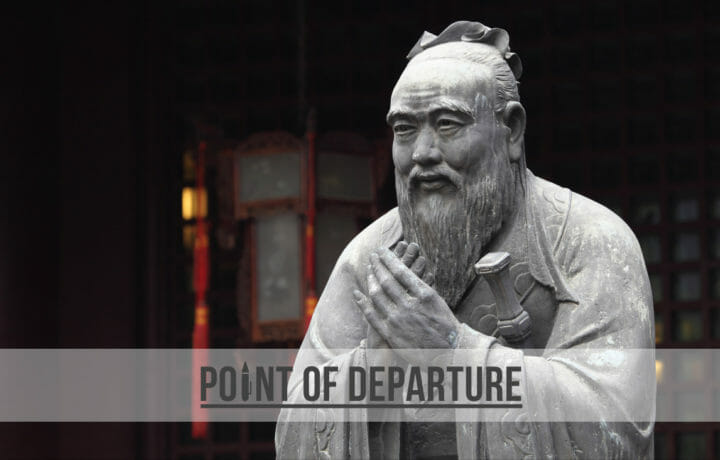“Ignorance is the night of the mind, but a night without moon and star.” – Confucius
As a child of the Baby Boomer generation, I grew up in an era of stupid jokes. Most of what I was exposed to would have been considered lame even by dad jokes standards: goofy one-liners, old Abbott and Costello routines, and jokes so bad that you had to groan your way through them. Every issues of the Scholastic reading catalog had at least one collection of bad jokes, usually a lot more.
One of our neighbors seemed to believe his calling in life was to entertain the boys in the hood. When he wasn’t swearing at us, he was tossing up a cascade of Confucius Say jokes, all of which were either racist, sexist, or a combination of both. Those that weren’t were just stupid. “Confucius say, a man who leaps off cliff jumps to conclusions.” “Confucius say, war does determine who is right but who is left.” “Confucius say, a man who sneezes without a Kleenex takes matters into his own hands.”
At the time, I didn’t know who Confucius was – just that his jokes were really bad.
THE MAN, THE MYTH, THE LEGEND
Born in 511 BCE in present-day Qufu into a royal family of the Chou dynasty, Confucius was a philosopher, teacher, and political figure of the Spring and Autumn period. Long considered the paragon of Chinese sages, his teachings – preserved in the Analects – focused on love for humanity, veneration for ancestors, respect of elders, self-discipline, and conformity to traditional rituals. Following his death, Confucianism became the official imperial philosophy of China and proved extremely influential during the Han, Tang, and Song dynasties.
Traditionally credited with having authored or edited many of the Chinese classic texts, including all of the Five Classics, Confucius was already long since dead when his aphorisms were compiled into the Analects. Those aphorisms – the source of many of those bad jokes of my youth – infused Confucian ideals to students who would eventually become officials in the royal courts of ancient China. His teachings gained prominence in subsequent dynasties, exerting significant influence well into the 16th century.
During this period of late Ming dynasty, Jesuit missionaries first translated Confucius into European languages. Michael Ruggieri, an Italian priest and founder of the Jesuit missionary effort in China, returned to Salerno in 1588 to complete his translation of the Four Books of Confucianism. Others followed in short order, spreading the wisdom of Confucius widely into the western world.
THE DIVINE COMEDIAN
Where the wisdom of Confucius became the source material for bad one-liners is a bit of a mystery. Maybe it was the advent of the fortune cookie – Confucian aphorisms were traditionally included with them, inscribed on a piece of paper in the hard, closed cookie. However the teachings of Confucius may have ended up as low-brow, playground humor, the effort was unnecessary. Confucius’s teachings weren’t just humorous in their own right at times, they were often scathing. In contemporary terms, many of them were wicked burns, the kind that leave someone feeling the aftereffects of a painful lesson.
Top 10 One-Liners by Confucius
Even a passing familiarity with Confucius reveals an intellect more than capable of humor. As with anyone who spends a lifetime capturing and teaching the wisdom of experience and observation, the lessons often come with a backstory. Although his stories are largely lost to time, the aphorisms that remain convey a subtle humor that is difficult to ignore. Some are more biting than others, the type that sting a little more than not. Among those, I have a few personal favorites.
1. “The person who says it cannot be done should not interrupt the person who is doing it.”
This one speaks for itself. Or so you would think if there wasn’t always “that guy” doing this very thing.
2. “What the superior man seeks is in himself; what the small man seeks is in others.”
Backstabbers and Blue Falcons alike understand this all too well.
3. “When it is obvious that the goals cannot be reached, don’t adjust the goals; adjust the action steps.”
It’s almost as if Confucius served in Afghanistan, too.
4. “Before you embark on a journey of revenge, dig two graves.”
You can almost hear Confucius telling someone, “If I go, you go.”
5. “Real knowledge is to know the extent of one’s ignorance.”
See also: Dunning-Kruger effect.
6. “Silence is a true friend who never betrays.”
Versions of this have been attributed to everyone from Abraham Lincoln to Mark Twain: “Better to remain silent and be thought a fool than to speak and to remove all doubt.”
7. “Study the past if you would define the future.”
We’ve clearly learned this lesson. And we seem to keep on learning it, too.
8. “Life is really simple, but we insist on making it complicated.”
We’ve all known this person, the one who makes everything hard. Apparently, Confucius did, too.
9. “Do not impose on others what you yourself do not desire.”
This is one of the classic lessons of leadership: don’t ask anyone to do something you’re not willing to do yourself.
10. “When anger rises, think of the consequences.”
Confucius understood the meaning of “F@ck around and find out.”
Confucius Truth Bombs Still True Today
Frankly, read enough Confucius and you’ll find a lot more snippets of practical wisdom like these. But if there is one that could have been on this list, but wasn’t, is one that I share frequently: “The superior man understands what is right; the inferior man understands what will sell.” Translated, “Talk is cheap.” It is. Even 2500 years ago, Confucius knew it, too.




